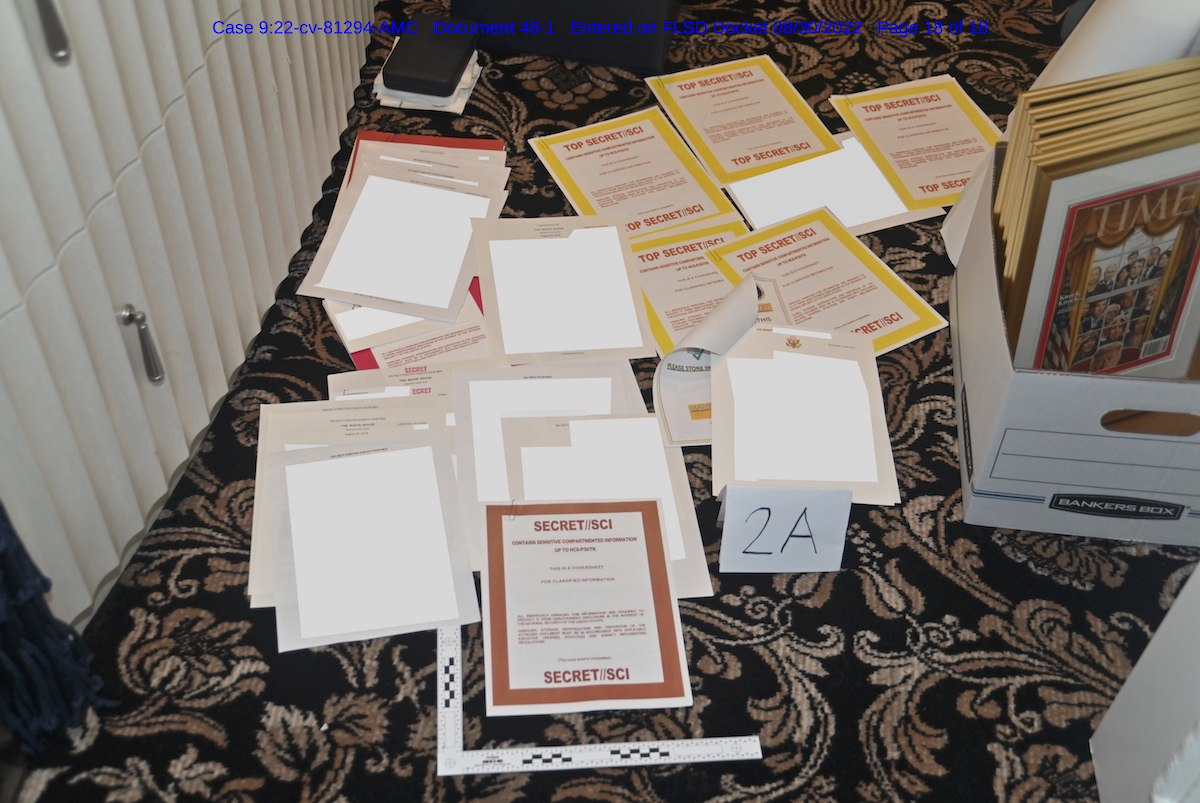
Federal prosecutors say FBI agents seized these materials from Mar-a-Lago. The contents of the documents were redacted with white squares. (Image via an Aug. 31, 2022 federal court filing.)
Federal prosecutors on Tuesday night filed a much-anticipated 58 pages of arguments and exhibits as part of an attempt to rubbish Donald Trump’s efforts to force a review of a materials seized via a search warrant on Aug. 8 at the former president’s Mar-a-Lago club and residence.
In previous court filings, the FBI indicated that the warrant resulted in the seizure of myriad secret and classified documents. Prosecutors showed showed some of the fruits of the search in a high-resolution but redacted color attachment to Tuesday’s late-night filing. The photo, reproduced at the top of this report, is described in the prosecutors’ own words as a “redacted FBI photograph of certain documents and classified cover sheets recovered from a container in the ’45 office'” at Mar-a-Lago.
The documents, the filing asserts, were kept in both a storage room and in Trump’s office at the palatial resort. The critical question raised by the documents is why some of the material allegedly migrated from one location to the other.
“Certain of the documents had colored cover sheets indicating their classification status,” prosecutors indicated. “The classification levels ranged from CONFIDENTIAL to TOP SECRET information, and certain documents included additional sensitive compartments that signify very limited distribution. In some instances, even the FBI counterintelligence personnel and DOJ attorneys conducting the review required additional clearances before they were permitted to review certain documents.”
Prosecutors with the U.S. Department of Justice said “the search cast serious doubt on the claim” by Trump’s associates that a thorough attempt to return documents to the government had been completed with any requisite degree of diligence.
“The government also developed evidence that government records were likely concealed and removed from the Storage Room and that efforts were likely taken to obstruct the government’s investigation,” prosecutors wrote ten pages into the filing.
The document does not accuse anyone of a crime.
The filing in question was submitted to U.S. District Judge Aileen M. Cannon, a Trump appointee, in the literal eleventh hour. The document was due by the end of the day on Tuesday.
Trump’s attorneys did not challenge the warrant directly. It was originally signed and supervised by U.S. Magistrate Judge Bruce Reinhart.
Rather, Trump’s attorneys asked Judge Cannon via a separate lawsuit stylized as Trump v. United States to appoint a disinterested “special master” to ferret out any privileged material from the materials seized.
Prosecutors rebutted those requests by writing that Trump’s complaints were little more than “wide-ranging meritless accusations leveled against the government.”
“Plaintiff’s filings present three issues: whether Plaintiff is currently entitled to the return of any property, to injunctive relief, and to the appointment of a special master,” prosecutors indicated. “Not only does Plaintiff lack standing to raise these claims at this juncture, but even if his claims were properly raised, Plaintiff would not be entitled to the relief he seeks.”
Prosecutors continued (legal citations omitted):
Plaintiff’s motion to appoint a special master, enjoin further review of seized materials, and require the return of seized items fails for multiple, independent reasons. As an initial matter, the former President lacks standing to seek judicial relief or oversight as to Presidential records because those records do not belong to him. The Presidential Records Act makes clear that “[t]he United States” has “complete ownership, possession, and control” of them. Furthermore, this Court lacks jurisdiction to adjudicate Plaintiff’s Fourth Amendment challenges to the validity of the search warrant and his arguments for returning or suppressing the materials seized. For those reasons and others, Plaintiff has shown no basis for the Court to grant injunctive relief. Plaintiff is not likely to succeed on the merits; he will suffer no injury absent an injunction—let alone an irreparable injury; and the harms to the government and the public would far outweigh any benefit to Plaintiff.
The document notes that a “more detailed” list of the materials seized from Mar-a-Lago was filed under seal. However, prosecutors did not object to its unsealing: ” the government is prepared, given the extraordinary circumstances, to unseal the more detailed receipt and provide it immediately to Plaintiff.”
Prosecutors went on as follows:
Even if the Court had jurisdiction to entertain Plaintiff’s claims, appointment of a special master is unnecessary and would significantly harm important governmental interests, including national security interests. Appointment of a special master is disfavored in a case such as this. In any event, the government’s filter team has already completed its work of segregating any seized materials that are potentially subject to attorney-client privilege, and the government’s investigative team has already reviewed all of the remaining materials, including any that are potentially subject to claims of executive privilege. Appointment of a special master to review materials potentially subject to claims of executive privilege would be particularly inappropriate because binding Supreme Court precedent forecloses Plaintiff’s argument that review of these materials by personnel within the Executive Branch raises any such privilege concerns. Furthermore, appointment of a special master would impede the government’s ongoing criminal investigation and—if the special master were tasked with reviewing classified documents—would impede the Intelligence Community from conducting its ongoing review of the national security risk that improper storage of these highly sensitive materials may have caused and from identifying measures to rectify or mitigate any damage that improper storage caused. Lastly, this case does not involve any of the types of circumstances that have warranted appointment of a special master to review materials potentially subject to attorney-client privilege.
Law&Crime will continue to review the filing in question. The full document and its exhibits are embedded below: